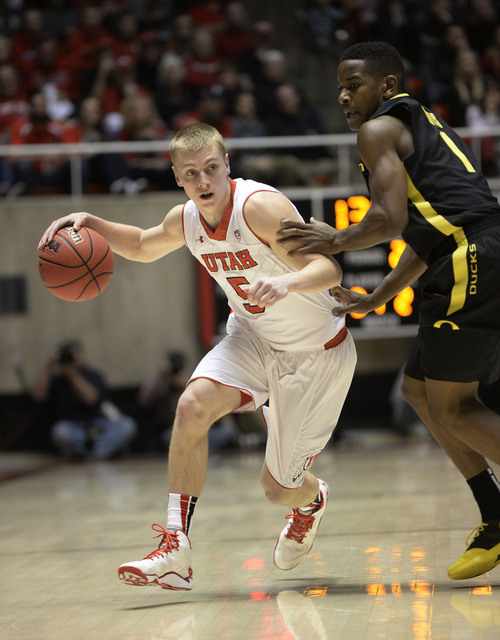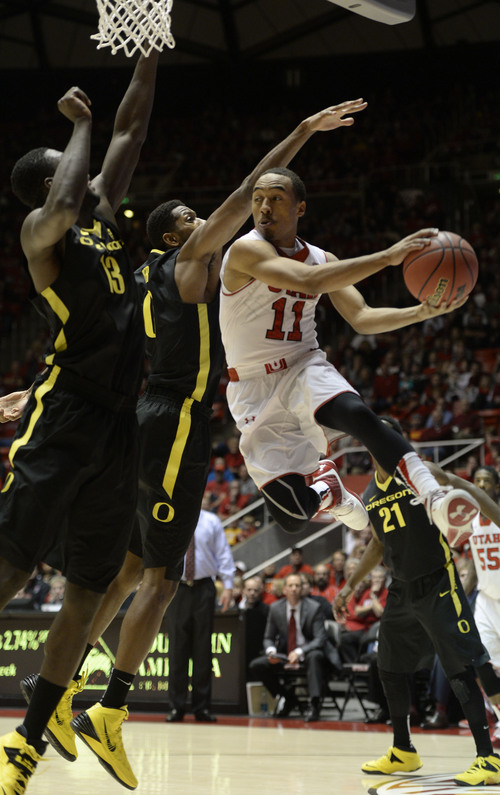This is an archived article that was published on sltrib.com in 2014, and information in the article may be outdated. It is provided only for personal research purposes and may not be reprinted.
As the crowd loaded itself into the Huntsman Center on Thursday night, the word that characterized its collective swing thought before the Utah-Oregon game was a far reach from confidence.
It wasn't quite anticipation.
It wasn't within shouting distance of expectation.
Instead, it was … curiosity, which, though strange for a base that had experienced 12 games already this season, was much advanced from what it had been for too long around Utah basketball: concern.
Concern, leaning toward distress.
That was then, this is … owww.
Curiosity turned to heartbreak, by the count of 70-68, at the end of an overtime loss to the 10th-ranked Ducks, when the Utes had two last chances, as it were, to win. They had possession at the end of regulation, the score tied, and the ball ended up in the hands of Jordan Loveridge, who missed a jumper. They had the ball at the end of overtime, when Dakarai Tucker inbounded to Dallin Bachynski, whose pass was stolen with a few seconds left by Oregon's Damyean Dotson, who then drove and flushed the game-winner with time nearly expired. A last-fraction-of-a-second attempt by Loveridge didn't drop.
Afterward, Larry Krystkowiak tagged the final Ute mistake in overtime "a classic killer play."
That's exactly what it was.
Bachynski said: "We had a miscommunication on the play."
Which was a little like saying: "A detonated nuclear warhead might cause a bit of damage."
Bachynski added: "I guess we have to learn from it."
He couldn't have been more correct on that one.
Learn how to win.
The crowd that had loaded itself into the Huntsman three hours earlier, so full of curiosity, walked out partially satisfied. This 13th game was supposed to give them, give everybody a clearer picture regarding the real progress the formerly 11-1 Utes had made, since the evidence up to that point was shrouded in opponent ineptitude.
Playing the Ducks in Utah's first Pac-12 game of the season was a much taller order than thunder-sticking Evergreen State and St. Katherine by a combined score of 252-95. The Utes might as well have played a string of entries from the Diamond Meats company league.
Oregon was a different duck. What was revealed about Utah on Thursday night was this: The Utes are a tough, motivated bunch, a talented team that can play rugged defense, can ugly up a game in a useful way, can take quality teams to the brink. What it has yet to figure out — here at home and on the road — moving forward, is how to finish with poise and efficiency.
How to grab victory by the throat. Against the Ducks, they did almost everything but that last thing.
"I knew we were ready," Krystkowiak said. "I thought we were pretty gutty. … It was an off night for us offensively."
The Utes had been shooting better than 54 percent from the floor coming in, and a ridiculous nation-leading 63.6 percent from two-point range. On Thursday, they shot a combined 38 percent. They heaved up attempts from distance to no avail, making just 3 of 19.
Utah also had shared the ball effectively, averaging 19 assists, which ranked second in the country, and it ranked first in assist-to-turnover ratio. On Thursday, the Utes had just 12 assists and 14 turnovers, the last of which did them in. Guard Delon Wright, a two-way player who Utah will lean on more and more as the season wears on, had been shooting 70 percent, averaging 15 points. Against Oregon, he hit 5 of 10 attempts, with 14 points. But the Utes' leading scorer, Loveridge, who averaged 17 and finished with 21, needed 23 shots, making eight, to get that total.
No big surprise that the Ducks are better than the Utes, who just two seasons back were the winners of only six games. Despite taking a victory from Oregon a season ago — Utah lost to the Ducks twice — it was a bigger surprise that the Utes had two chances to beat a better iteration of them now.
Didn't happen. It could have happened, but it wouldn't happen.
"It was a good game," Loveridge said. "Good battle. Good team."
He added that his side's strong showing against the Ducks shocked none of the Utes:
"We knew we could play with them. We knew we could play with anybody in the league."
So, they can.
The question remains: Can they beat them?
GORDON MONSON hosts "The Big Show" with Spence Checketts weekdays from 3-7 p.m. on 97.5 FM/1280 and 960 AM The Zone.





